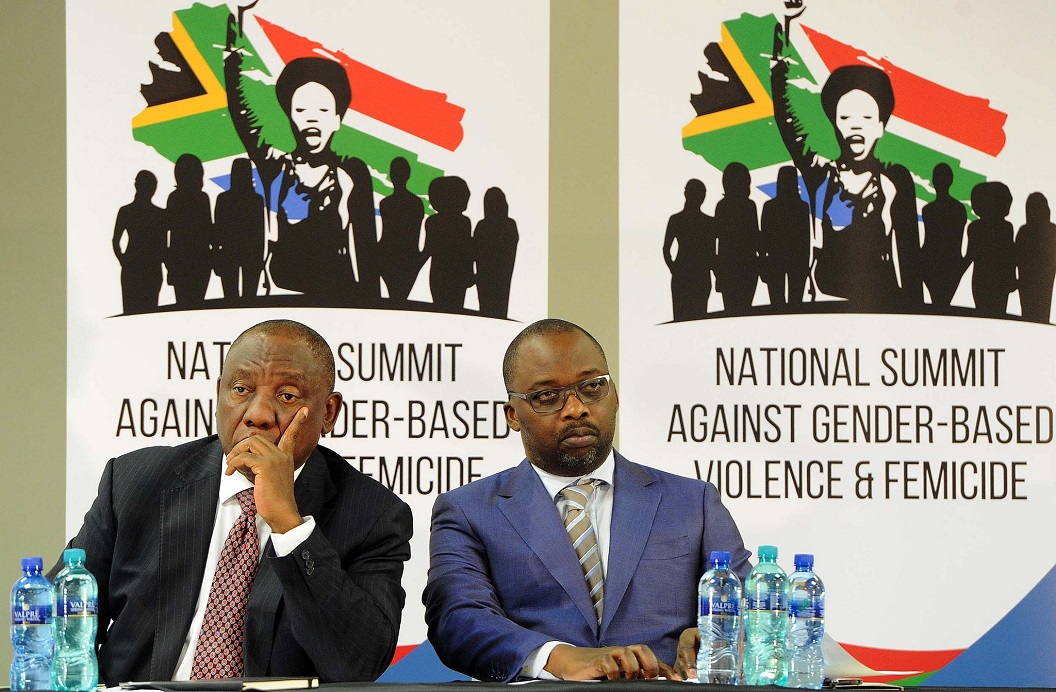
OPINION
“Women should not have to protect themselves from men. They should feel safe and secure with us as men,” said President Cyril Ramaphosa during the joint parliamentary sitting on September 19. Ramaphosa called the sitting following weeks of protests and demonstrations against gender-based violence. The president used the sitting to address the recent xenophobic attacks as well.
Joint sittings of parliament are used to address serious issues affecting the nation.
Despite the roaring applause the president received from his party’s benches, it was difficult to find anything substantive in his speech. Ramaphosa waxed lyrical about all the measures the government would be putting in place to fight gender-based violence. Yet it seems like the president and his cabinet still don’t understand the issues at hand.
Gender-based violence
He announced that the government would be increasing funding to the fight against gender-based violence. They would be looking at preventative measures to take. He said he would be approaching the private sector to ask them to contribute funding.
Ramaphosa mentioned a sustained media campaign to educate people. These were all seemingly presented as if they were something new. The applause that reacted to each of his announcements echoed the idea that these were new ideas.
Yet, these are not new ideas. Most of the plans announced by the president were things that civil society and ordinary South Africans have been calling for. On Friday September 13, hundreds of women and men gathered outside the Johannesburg Stock Exchange (JSE). They called on the private sector to pledge 2% of their earnings to the fight against gender-based violence. The JSE said they would think about it. So for the president to announce that he would approach the private sector felt a little reactionary. It had been done already.
Then with his announcement of the media campaign. Last year thousands of women and gender non-conforming people marched around South Africa under the banner of The Total Shutdown. At the Union Buildings, the Total Shutdown presented their demands to the president. Of the 24 demands presented, one of them called for a sustained media campaign. Perhaps it is not allowed in terms of the rules of parliament but the lack of acknowledgement of the work done by civil society is a little sad.
The president laid out the measures he would call on the government to take. This included the prevention of gender-based violence, strengthening the criminal justice system, enhancing the legal and policy framework, providing adequate care, support and healing for victims of violence, and lastly measures to improve the economic power of women in South Africa.
These are all sound very interesting and impactful, but most South African women are tired of hearing plans. The government might acknowledge their shortcomings but that’s still not enough. It’s not enough for the president to stand up on the podium with his pretty plans and yet when it comes to implementation, there is nothing.
The worst thing is the government wants to tackle these issues but seemingly don’t understand the underlying issues that cause gender-based violence and xenophobia. Until that point is reached, there is still a long way to go.
Xenophobia
Ramaphosa said: “There is no place for xenophobia in this country.” He added that South Africans are not xenophobic.
However, this is another disingenuous statement. South Africans are xenophobic. It begins with the government institutions and political parties filtering all the way down to the people on the street. It’s in simple things like the use of word foreigner which Ramaphosa used throughout his speech. It could be bigger things like mayors and ministers spouting xenophobic rhetoric to cover up their own leadership shortcomings.
It’s understandable that the president has a difficult job. (He did sign up for it though) He has to balance making South Africans citizens happy and ensuring they think it has their interests at heart. On the other hand, he has to toe the line with other African countries and foreign investors. It can be a lot.
However, he is an elected representative. It is his job to find solutions to problems. It is longer acceptable to feign ignorance of the issues facing his country. It’s time for the president, his cabinet and parliament to step up and implement, not just find solutions to the issues facing this country. The continuing deflection of blame is also problematic. The president spoke at length about the criminality and criminal behaviours shown by both South Africans immigrants.
He didn’t address the xenophobic behaviours and ways the government institutions influence these behaviours. The government’s failure to provide adequate services to its people and protection for immigrants leads to these tensions. The government and ministers continue to lead luxurious lives while people on the ground are forced to fight for scraps. And then the government paints them all criminals and violent. Leadership which is so disengaged from its base doesn’t bode well.
“We must remove the cancers of gender-based violence and xenophobia so that we can hold our heads up high among the community of nations. The time for talk is over,” said the president in ending. We can only hope that for once he will listen to his own words and actually take concrete action for once.








